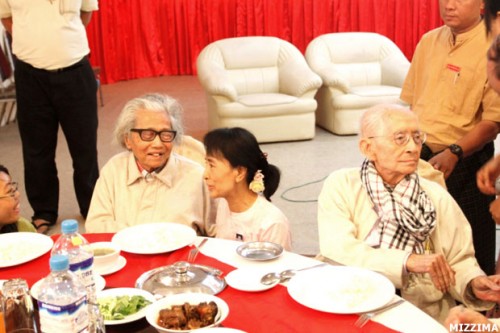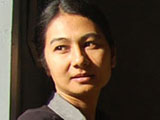Dagon Tayar, Living Record of History
A profile of Dagon Tayar, a 94-year-old Burmese peace activist, writer and editor.

Aung San Suu Kyi, on her knees, speaks to elderly writer Dagon Taryar at the 92nd birthday ceremony of prominent politician Thakhin Thein Maung (Wakhema) on Wednesday, February 2, 2011. Photo: Mizzima
When we, Burmese people, hear the name of 94-year-old writer Dagon Tayar, we immediately think of peace. Since Burma was a British Colony he has been speaking about and working for peace. He became the chairman of the World Peace Congress (Burma) in 1951, vice chairman in 1952 and an attendee in 1953 and 1974. Beyond that, he was the chairman of the Writers’ Association in 1950, as a representative of the All Burma Students’ Union, as the head of publicity of the Rangoon University Students Union in 1940 and as an editor for multiple literary magazines.

- In Burma if you want to hear about issues the newspapers can’t talk about, you should go to a tea shop. Tea houses were where I used to meet with other activists, writers and artists, as well as where I built friendships. Within tea houses we talked about Burmese writers, literary trends we noticed, and, of course, politics. This online space attempts to emulate the conversations I enjoyed in Rangoon’s tea houses.

- Khet Mar is a journalist, novelist, short story writer, poet, and essayist from Burma. She is the author of one novel, Wild Snowy Night, as well as several collections of short stories, essays and poems. Her work has been translated into English and Japanese, been broadcast on radio, and made into a film. She is a former writer-in-residence at City of Asylum/Pittsburgh.
As a writer, poet, and peacemaker, he made many remarkable statements including “politics is making enemies become friends.” He also said, “I don’t have anyone I hate. I only have people who I love.”
Dagon Tayar expands on this in his book Culture of Politics. Burmese philosopher Sun Tun Thaung wrote an article about this book, commenting, “Dagon Tayar’s ideology is Ethical Epistemology, which is based on the idea of cause and effect. Dagon Tayar explained in his book that ‘It is not because I have no enemies that I have no hate, it is because I have no hate that I have no enemies.’
In the preface of another book, Images, he wrote: “Once, during the revolution for national independence, the people were united to fight against the British army and Japan. This united force was set in stone then, and I now want to rediscover this history.” Based on his experience fighting for independence, he added, “We should build unity to have peace.”
He carried out many events and activities, not only for the World Peace Congress but also to encourage a ceasefire in Burma. Because of these activities General Ne Win put him in jail from 1963-1967.
Recently, in Burma, there have been battles between ethnic forces and the government army. These battles resulted in signs of civil war, which caused Dagon Tayar to campaign for peace once again, saying: “I hope that artists and intellectuals can participate in the process of creating peace. Creating peace is difficult to achieve, but it is necessary.”
I got to know Dagon Tayar during the early 1990s when I was still a new writer. After the 1988 uprising I proofread the sequel to his novel We Will Definitely Get Our Era. The book is about the fight against the British and ends with a paragraph written at the time that Burma gained independence. Unfortunately, because of censorship in Burma, he had to publish it abroad. At the time, he was nearly 90 years old, and I thought that he would spend the rest of his life with his granddaughter. But, he told me, “I will continue this series into the future.” And that’s why he has lived so long: He is always thinking about working for peace and sharing his ideologies and experiences.
Dagon Tayar has been a part of the fight for independence against Britain and Japan, the civil war period post-independence, the 50 years the country was under military government, the 1988 uprising and proceeding demonstrations, the 2007 Saffron Revolution, and the 2010 civilian government’s start on the “Road to Democracy.” He saw these periods with his own eyes and participated throughout this history. He worked with a commitment to peace and love for the people who loved him in return. I feel that he is a living record of history and I miss that “history book.”
Translated by: Courtney Wittekind.





One Comment on "Dagon Tayar, Living Record of History"
Thanks, Sis. You’re one of the Few who make the world knows Burma and its GREATNESS and Country’s RELIABLE & ADMIRABLE Peacemaker! I’m proud of your great effort. Thanks, sis.